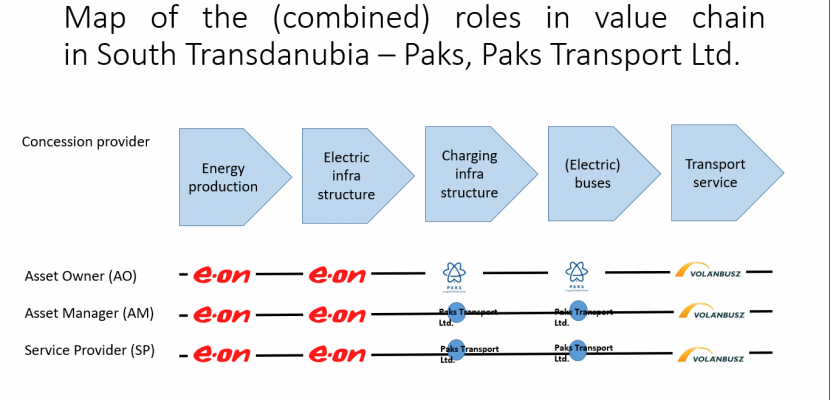
Business model change by the transition from diesel-fuel based to electricity-based e-bus public tr.

About this good practice
Deployment of e-buses was marked with change of public transport operator (PTO) company at City of Paks. During the diesel bus period (until end of 2020), state owned PTO called Volánbusz owned the buses and provided bus public transport at Paks. When 10 Solaris e-buses started their operation in Paks (early 2021), diesel buses were not in service any more. New e-buses were owned by Municipality of Paks and the PTO became the Paks Transport Ltd, a 100% Municipality of Paks owned company. What is more, e-bus public transport is based on largely locally produced, stored and used renewable electricity.
The above change was marked with increase of number of bus services per day (more than two and half times!), in line with increased number of buses in operation (in autumn-winter-spring period 7-8 buses from 10 are in roaster, in late spring and summer 5-6 buses can provide service). This change affected pricing and maintenance policy of public transport: bus tickets were set for a preferential 200 HUF / ticket, being well affordable for every local community member. New drivers and maintenance staff had to be employed and protocol to be practiced. The business model underwent a profound transition in short time, and it is worth examining in detail by other European regions, too.
Model-wise, instead of Volánbusz, Municipality of Paks and Paks Transport Ltd. became main stakeholders. Main beneficiaries are the Paks public e-bus transport users.
Resources needed
In financial terms transition from diesel-based to fully electric local bus transport:
1.) needs financing sources to procure e-buses,
2.) requires changes in terms of staff of the PTO company (drivers experienced with the right driving of e-buses, new mechanic staff, etc.).
Evidence of success
- Increase of annual number of Paks bus service by 251%, based on cheap locally produced electricity.
- Awareness raising campaign with free of charge travel for one month period made e-buses more popular.
- Affordable pricing: 1 journey ticket (200 HUF, cca. 0.50 EUR), wallet friendly daily tickets, weekly, monthly passes.
- Extended Paks Transport Ltd. bus service network with new bus stops introduced for wider outreach.
Potential for learning or transfer
Transfer-wise to other settlements and regions, the main lesson learnt at Paks is that the transition from fully diesel to fully electric bus fleet has several business model consequences. These may include change of the PTO (as in the case of Paks), the challenge of provisioning the right staff and management of the changing PTO, overviewing and modifying the route network, pricing issues, initiatives targeting the passengers, and provision of the cheap, locally produced, stored and consumed electricity coming from the renewable energy sources. Last, but not least quite often the smooth transition also required effective cooperation of the state and local administration, and the e-bus manufacturers (Solaris, Poland) and the local PTO (Paks Transport Ltd.).
Further information
Website
Good practice owner
You can contact the good practice owner below for more detailed information.

